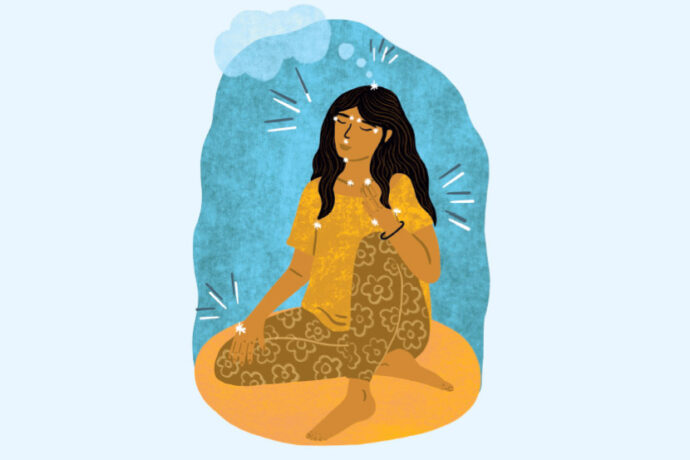
While there is no denying a balanced, nutritious diet is key, the missing link to greater health and life-longevity may very well center around optimism.
Have you developed a pattern of tuning in to the negative? Could you list three things that you’re grateful for? When was the last time you gave well-wishes to a stranger or received a hug?
We’ve heard the old wives’ tale that an apple a day keeps the doctor away. While there is no denying a balanced, nutritious diet is key, the missing link to greater health and life-longevity may very well centre around optimism.
Developing research suggests that there is a strong relationship between being optimistic and being physically well. Breathe spoke with Associate Professor Dianne Vella-Brodrick, Deputy Director of The Centre for Positive Psychology at the University of Melbourne, who revealed that feeling happy is linked with better general health and a longer life.
In 2003, a landmark study revealed something psychologists have long suspected; people who experience positive emotions are at a reduced risk of becoming ill. Researchers assessed a group of 334 people aged 18 to 54 for their tendency to experience positive emotions like happiness, pleasure and relaxation, along with negative emotions like anxiety, hostility and depression – participants were then injected with nasal drops that contained the common cold. Irrespective of age, gender, education, race, body mass and even season, those who expressed positive emotions more frequently were less likely to develop the common cold.
Since then psychologists have continued to identify the link between being optimistic and being physically well, in a new field of research called ‘Positive Psychology’.
Positive Psychology And Health
Positive psychology encompasses a variety of techniques that focus on: developing positive emotions, developing positive experiences, and working on improving our positive character traits, such as loyalty, humility and integrity.
Positive psychology does not discount that in life there are negatives. Instead positive psychology aims to look at the situation conclusively and scientifically to better understand human experiences and determine how to best foster thriving individuals, communities and societies.
Going beyond the idea that wellness is simply the absence of illness, positive psychology looks at the body as a complete system. Along with being disease-free, research shows that being optimistic is linked to:
- Improved heart health
- Less frequent and briefer ailments
- Greater recuperative ability
- Rapid wound healing
Greater life expectancy
In addition to how long a person lives, there is also emphasis on how well a person has lived. This is often referred to as ‘quality adjusted life years’, where the emphasis is on quality of life rather than quantity. A life lived in good health is quality of life indeed.
Relationships And Health
Further research has found that loving-kindness meditation (or “Metta” meditation), the practice of mentally directing well-wishes, kindness and positive mantras towards others, increases our capacity to be kind, improves positivity and life satisfaction and decreases heart rate – and a slower beating heart may translate into a longer life-span.
When we develop strong and meaningful connections with other people, a hormone called oxytocin is released which makes us feel good by lowering anxiety and improving self-esteem. Research has found that warm touch such as hugging, particularly among those we already feel bonded to, releases oxytocin and improves physiological health.
When oxytocin flows through the body it lowers our stress hormone (cortisol).
A decrease in cortisol reduces blood pressure, improves mood and increases tolerance for pain. The result? Improved mental and physical health. The moral of this story, as told by positive psychology advocate Chris Peterson, is that the connections and positive relationships we have with other people affect our health and the length of our life!
Boost Your Mood, Boost Your Life!
If cracking a smile sounds like a better pastime than an hour spent in the doctor’s office, give these mood-boosting strategies a try:
Fight the negativity bias. Thanks to an evolutionary hangover, when positive and negative things happen, we’re more likely to pay attention to the negatives. However, you are in charge of your thoughts – so it’s important to make a deliberate effort to seek out and devote attention to the positives in life. Try counting acts of kindness, remembering praise and savouring a beautiful meal or sunset.
Express gratitude. Keep a journal or talk to friends and family about how grateful you are for the things in your life that make you feel happy. A good exercise to practice daily is writing down at least three things you are grateful for. Notice that the exercise becomes easier with each new day as you start to seek-out the positives instead of the negatives.
Practice loving-kindness meditation. Direct good vibes towards others. Cast out into the world the same energy and compassion that you’d like your world to be constructed from.
Develop good quality relationships. Minimise gossip and negative talk. And remember to hug those special people in your life.
Dianne Vella-Brodrick, MAPS is Associate Professor and Deputy Director at the Centre for Positive Psychology, University of Melbourne, and member of The Australian Psychological Society (APS). The APS is an active member of advocacy organisation Mental Health Australia. For useful contacts to support you on your journey to greater positivity and health visit www.mhaustralia.org/need-help


















